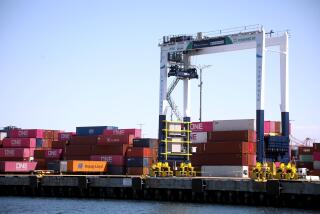Bush Budget Includes $9-Billion Cut in Highway Funds
- Share via
WASHINGTON — President Bush’s budget would slice $9 billion out of federal aid to state highway programs for next year, largely because of a drop in gasoline tax collections, federal and state officials said Monday.
The biggest loser would be California, which would face a reduction of $663 million from the $2.5 billion in federal aid it is receiving this year, according to the U.S. Transportation Department. “That’s significant money,” said Caltrans Director Jeff Morales.
Federal aid played a major role in Gov. Gray Davis’ planned billion-dollar increase for transportation programs next year to relieve congestion and improve the flow of goods. Morales said state officials had not begun to figure out where they would make the necessary trims.
“Our goal first and foremost is to head this off,” Morales said. “In tough economic times, you don’t turn away from investment in infrastructure, which has tremendous benefits for job creation and economic growth.”
The looming $663-million federal cut represents the equivalent of 7% of Davis’ $8.9-billion transportation budget. Morales said not all of the reduction would be absorbed by his department, however, since some federal money goes directly to counties and cities.
Word of the federal aid cut--nearly 29% from the $31.8 billion budgeted this year--sparked plans for intense lobbying by state officials and the road-building industry.
After California, the big losers in the federal aid derby would include Bush’s home state of Texas and the state of Florida, where his brother, Jeb Bush, is governor.
John Horsley, executive director of the American Assn. of State Highway and Transportation Officials, said the construction industry was projecting a loss of 90,000 jobs nationwide in 2003 if the cuts are made.
“In an economy that’s in recession, do we want to worsen the situation?” Horsley asked.
Bush administration officials say their hands are tied. A senior Transportation Department official, who spoke on condition that he not be identified, said Congress had decreed that highway money be distributed according to a formula.
The formula depends on revenue from federal taxes on gasoline and on sales of big trucks, both of which have declined substantially in the recession. The problem has been magnified because federal highway funds distributed to the states for 2002 were based on overly optimistic revenue projections, and the law requires that such generosity in any one year be followed by compensating cuts in the next year.
The official also warned that bailing out the states would add to the federal deficit.
Horsley said the states should not have to pay for the federal government’s faulty estimates. Like Davis, he said, many governors had already assumed that the federal dollars would be in their budgets.
“The forecast was exaggeratedly high,” he said, “and now we are being told we have to pay the price.”
The federal highway trust fund has a positive balance of $18.5 billion, and the states want at least some of that used to ease the sharp cutback.
But federal trust funds exist in account ledgers only. The revenue from the gasoline and truck sale taxes goes into the same big pot as personal income tax revenue. Drawing down the $18.5-billion “balance” in the highway trust fund would entail spending money from other sources, including the personal income tax.
The American Road and Transportation Builders Assn. has scheduled a lobbying campaign on Capitol Hill next week, when Bush formally releases his budget. Dozens of contractor executives will descend on members of House and Senate transportation panels, as well as on the Federal Highway Administration.
“This is not a done deal yet,” said Matthew Jeanneret, a spokesman for the industry group. “We’re bringing out the grass-roots lobbying army. There’s going to be a blitz up on the Hill.”
Texas stands to lose $568 million; Florida, $336 million. Other large states facing significant shortfalls include Pennsylvania, $371 million; and New York, $371 million.
More to Read
Get the L.A. Times Politics newsletter
Deeply reported insights into legislation, politics and policy from Sacramento, Washington and beyond. In your inbox twice per week.
You may occasionally receive promotional content from the Los Angeles Times.










